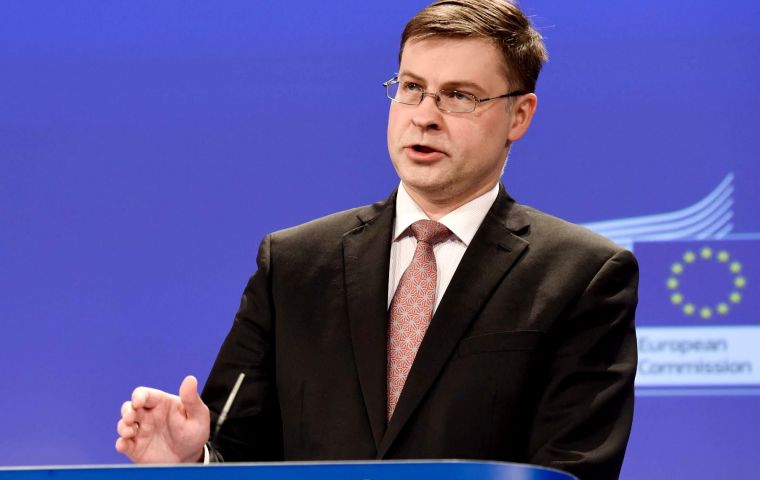MercoPress. South Atlantic News Agency
EU conditions ratification of trade deal with Mercosur: France and Germany lead objections
 “A growing number of EU country states and interested parties underline the significance of sustainable development in Mercosur countries” Dombrovskis said
“A growing number of EU country states and interested parties underline the significance of sustainable development in Mercosur countries” Dombrovskis said The European Union expects a clear commitment from Mercosur countries, particularly Brazil, that it will respect the sustainability issues included in the EU/Mercosur trade agreement, before any deal is ratified.
European Commissioner for Trade Valdis Dombrovskis made the statement following a meeting of the 27 country members Economy ministers held in Berlin over the weekend.
This follows growing concern among EU countries, particularly Germany with the Brazilian government's environmental policy and the fires consuming the Amazon rain forest, under the administration of president Jair Bolsonaro.
“A growing number of country states and interested parties underline the significance of sustainable development in Mercosur countries, supporting the Paris Agreement and stopping deforesting, especially in Brazil”, Dombrovskis pointed out in Berlin.
“These issues must be addressed seriously and the European Commission expects to reach an understanding with Mercosur members”.
The EU Domestic Market Commissioner Thierry Breton admitted that EU nations remain divided regarding the EU/Mercosur trade deal because of the deforestation going on in the Amazon and the compliance with European rules.
“Not all of us are aligned on this issue, and we definitively need to hold further discussions among ourselves”, Breton said.
Economy minister Peter Altmaier from Germany the country which currently holds the rotating presidency of the EU confirmed the divergences among country members, but was moderately optimistic.
“There were different positions...some points need further discussion which we hopefully can clarify”, he added, but “without opening the whole trade package, a sustainable solution could be reached”.
“Europeans are clearly willing to avoid divisions on the Mercosur trade deal, and need to discuss what can be done, ...without anticipation or pressing on time”
But Altmaier underlined that since the signing of the agreement last year, “many things have changed in the EU relation with the Amazon basin rainforest countries, and this has become a very, very difficult issue to address now”
Trade Commissioner Dombrovskis said the deal is under legal review and the European Commission has to decide on the ratification process in a later period.
The EU/Mercosur agreement was reached in June 2019, following twenty years of negotiations, and to become effective needs the ratification of all countries involved, 27 in the EU and four from Mercosur.
At the time the Brazilian administration of president Bolsonaro celebrated the event as a great triumph of foreign policy, but never stopped antagonizing several EU members on environmental issues, rapidly reinforcing resistance to the trade deal.
France which was never enthusiastic with the deal exposing concerns regarding its agriculture sector, ended leading the resistance. Last year, president Emmanuel Macron insisted on the implementation of greater environmental protection by Brazil, as a condition to ratify.
Last week the French government reaffirmed its position on the environmental issues and put forward three demands to Mercosur: stop deforestation; respect and compliance with the Paris agreement on climate and that produce imported from Mercosur abide by European environment and sanitary rules.
Other countries followed, given the Brazilian government reluctance to act on deforestation: Austria, Holland and Belgium have announced they will not support ratification and so have Ireland and Luxemburg.
Until recently Germany remained among the strongest supporters of the trade deal, and last year Angela Merkel even defended strongly the position in the German Bundestag. But last month, Merkel in a clear message to the Brazilian government publicly stated she had “serious doubts” on the implementation of the deal, and her Minister of Agriculture, Julia Klöckner has openly declared her opposition.
In effect the growing influence of the Greens in German politics is having a great impact on Berlin's policies, and the coming round of elections.




Top Comments
Disclaimer & comment rulesCommenting for this story is now closed.
If you have a Facebook account, become a fan and comment on our Facebook Page!